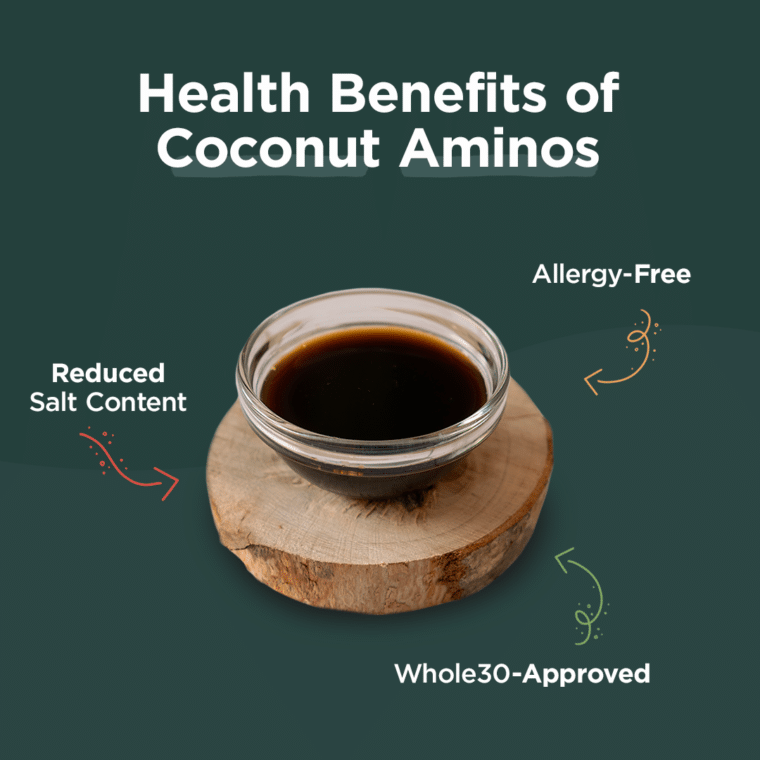Soy sauce is a wildly popular cooking ingredient and condiment that originated thousands of years ago in China and has since become a cooking staple in many other parts of the world.
Despite being a delicious addition to many dishes, a concern with soy sauce is its high amounts of sodium, in addition to the potential negative impacts of soy itself.
If you’re someone who is looking to limit or cut back on your soy and sodium intake, then replacing your soy sauce with coconut aminos may be a perfect solution. Read on as we explore the coconut aminos vs soy sauce debate.
What is soy sauce made of?
Soy sauce, also known as shoyu and soya sauce, is made with soybeans, wheat, salt, and a fermenting agent. The traditional process of creating soy sauce often takes from one month to four years of fermentation in a brine solution. The amount of fermentation time causes different flavors within the sauce, but soy sauces will also differ based on what country they’re made in.
Types of soy sauce
Japanese soy sauces are known to use equal parts wheat and soybeans, while Chinese soy sauces traditionally have a higher ratio of soybeans to wheat.
The two most common types of Chinese soy sauce are a light soy sauce with a thin consistency and a darker, thicker soy sauce that often has molasses or sugar added to it, making it a sweeter, full-bodied soy sauce.
There are five common Japanese soy sauces, and they are as follows:
- Koikuchi-shoyu or dark soy sauce is the most common type found in Japan and overseas.
- Usukuchi-shoyu or a light soy sauce has a shorter fermenting time and a milder taste.
- Tamari-shoyu or Tamari soy sauce contains very little wheat that results in a milder aroma and darker color.
- Shiro-shoyu or white soy sauce has a much higher ratio of wheat to soybeans, resulting in a very light almost yellowish color — hence the name.
- Saishikomi-shoyu or double fermented soy sauce is more costly and is typically used for sushi and sashimi dishes.
What are coconut aminos?
Coconut aminos are a dark-colored sauce that has a taste similar to soy sauce with its salty and savory notes. Despite its name, however, coconut aminos do not taste like coconuts.
What are coconut aminos made of?
Coconut aminos are made from the fermented sap of coconut palm and sea salt. After its extraction, the sap gets stored for the aging process, where it ferments due to the natural sugars present within it. This results in a savory sauce similar to soy sauce, but with a hint of sweetness.
Why is coconut aminos an alternative to soy sauce?
Their extremely similar look, taste, and consistency makes coconut aminos an ideal soy sauce alternative for many, especially those with certain dietary restrictions. For those allergic or with sensitivities to soy, wheat, and gluten, look no further than coconut aminos for your perfect soy sauce substitution!
Reduced salt content is also another appeal of coconut aminos as an alternative to soy sauce. With coconut aminos only containing 90 mg of sodium per teaspoon, as opposed to the traditional soy sauce content of about 280 mg of sodium in the same serving size, you’ll be reducing your salt intake by about 32%.
You may be wondering, well how does a low-sodium soy sauce compare to coconut aminos? To be honest, low-sodium soy sauce isn’t much better than regular soy sauce, hovering around 575 milligrams of sodium per tablespoon. If you’re looking to reduce your salt intake, we’d still recommend coconut aminos over a low-sodium soy sauce.
Healthy Hint: Coconut aminos are also Whole30, Paleo, and Keto-friendly, making them a perfect ingredient substitution for those in the process of or looking to adopt one of these lifestyle changes!

Coconut Aminos Meals
Coconut aminos can substitute for soy sauce in pretty much any recipe you find in a 1:1 ratio. Did you know we use coconut aminos in some of our Snap Meals? Check them out below!
Korean BBQ Meatballs
We’ve paired our soy-free, coconut aminos-based Korean BBQ sauce with beef meatballs, sesame broccoli, and kimchi carrots for a nutrient-dense and absolutely delicious take on classic flavors.
Peppercorn Steak
We took sirloin steak and paired it with ghee-roasted potatoes, then took it to the next level with our house-made peppercorn sauce, a delicious mixture of coconut milk, coconut aminos, ghee, and dijon mustard. Talk about the perfect combo!
Mongolian Beef
Our low-carb version of this takeout classic features a house-made, soy-free Mongolian sauce and high-quality 44-farms beef, all on a bed of sesame broccoli.
Your takeaway
Coconut aminos make an excellent soy sauce substitution especially for those with dietary restrictions and individuals looking to reduce their sodium levels. While the taste is very similar to soy sauce, some have noted it as much sweeter and more like a teriyaki sauce — but you’ll never know if you like it unless you try it! Which soy-free Snap meal are you excited to try next?





Leave a Reply
No Comments